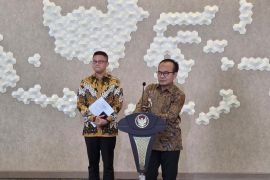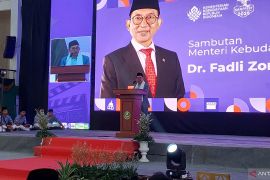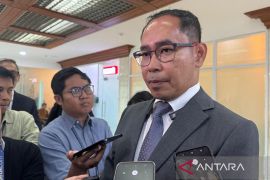"So, we will regulate the spread of false news in the social media. All are free to express opinions; they are allowed to do so, but they should do it in an elegant and respectable manner," Wiranto stated.Jakarta (ANTARA News) - The Indonesian government will soon establish a National Cyber Agency to help overcome the threat of fake news that aims to spread slanderous messages and hatred through social media.
President Joko Widodo (Jokowi) had instructed him during a meeting to immediately establish the National Cyber Agency, according to Coordinating Minister for Political, Legal and Security Affairs Wiranto.
The president had directed that the agency be formed at the earliest to curb the spread of false news that could threaten people and harm their interests.
The spread of hoax messages through the social media, among others, can create confusion and doubts about the veracity of the information. Irresponsible parties can thus exploit this confusion created to sow hatred, and create disunity and hostility among the people, the minister explained.
"We are technologically advanced now. We are grateful that technology has facilitated better education and helped disseminate information faster, but we are also concerned because individuals could use it to spread defamatory material. This confuses people," Wiranto stressed on Tuesday (January 3).
If this happens, the nations development will be hampered. It will put the people, nation and the state at a disadvantage. People should be responsible while using technology and spreading information, Wiranto pointed out that.
"So, we will regulate the spread of false news in the social media. All are free to express opinions; they are allowed to do so, but they should do it in an elegant and respectable manner," Wiranto stated.
Noting that the social media has a huge influence on the public, Director General of Culture of the Ministry of Education and Culture Hilmar Farid said many were still unable to differentiate between fake and real news.
Even professors, doctors and academicians were likely to believe the information available on the social media, Farid added.
"The social media has an extraordinary influence. A false piece of information, which is given a picture and a title, can spread quickly (after it is uploaded)," the director general said.
Usually, those who believe in hoax materials belong to the transitional generation. There are many professors and doctors who believe in such false news (disseminated through social media), a research conducted by Farid with the Ministry of Communication and Informatics (Kominfo) in 2015, found out.
The victims of hoax and misleading short message services (SMSes) are mostly those who have high intelligence, the research revealed.
This generation was born before the onset of (information) technology and were exposed to it only at an adult age, Farid said while explaining the transitional generation.
"Adversely, children who were born after the advent of the (information) technology do not believe in hoaxes easily. These children are more selective, because they are able to trace the sources of the news with the help of technology," Farid affirmed.
In order to deal with false news, a media literacy campaign must be launched to help people detect hoaxes, false news and determine if the website carrying such information is credible.
In the meantime, President Jokowi earlier asked all ministries to fight disinformation circulated through the social media. He demanded that sanctions be imposed on social media platforms that circulate hoaxes and spread hate messages.
Therefore, a cyber agency must be set up soon to overcome the spread of hoax news, he asserted.
The agency, which will monitor national cyber activity, will be part of a national program under the coordinating ministry for political, legal and security affairs.
The establishment of the agency has been consolidated with 12 ministries and agencies under the coordinating ministry, according to Wiranto.
"The agency should be formed immediately. If possible, the agency will be inaugurated this month," he remarked. The establishment of the National Cyber Agency has been under discussion since 2015, but in mid-2016, the plan was dropped by President Jokowi owing to budget constraints.
After taking into account the potential threat to the nations internet infrastructure from hackers, the government in October 2016 revisited the plan to establish the agency.
The Houses Commission I on Communications and Information has lent support to the speedy establishment of the National Cyber Agency to curb hoax news circulating among the public.
"I think it is a good thing, if it is established soon, so as to reduce or even eliminate the spread of hoaxes (information)," declared Commission I Chairman Abdul Kharis Almasyhari in Jakarta on Wednesday (January 4).
The establishment of a cyber agency is expected to prevent the people from being misled by fake news, as they could lead to slander. The Commission I chairman of the House of Representatives pointed out that pieces of information presented to the public should be valid and accurate, so that they do not create slander.
"I think even a small piece of false news should be prevented from being circulated, as it could mislead the people," he emphasized.
It has been on the governments discourse for a relatively long time, but was yet to be established, Almasyhari confirmed. The Commission I must take up the matter with the authorities concerned. The commission is willing to again lend a ear to the governments inputs after it expressed willingness to form it in 2017, he added.(*)
Reporter: Andi Abdussalam
Editor: Heru Purwanto
Copyright © ANTARA 2017










